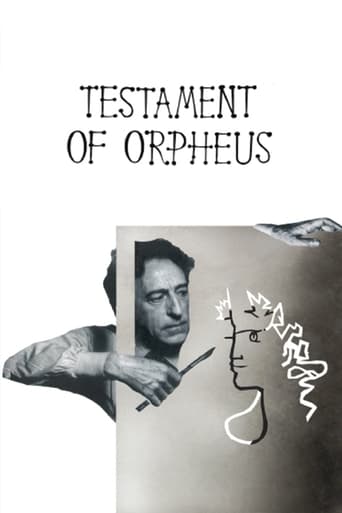mphilipm
While I had surely seen the second film in Cocteau's Orpheus trilogy if not the first as well, I suspect I was in no position to appreciate any of what Cocteau accomplished. Now I'm about the same age he was when he did the Testament. I remember the time period for the second and third pictures, having grown up in it. But how all three of these films really transcend time as Cocteau is trying to show you works of art should! I had to rely on the subtitles for the sense of the lines but it was no matter. I don't remember anything else like these films. They are political to the extent they lobby for the poet's point of view. And in spite of the black and white and old prints their effect is most striking. Orpheus Descending and Testament sometimes look like the inspiration for Rebel Without a Cause. And Testament has some pithy comments on modern technology and the short comings of air travel that seem funnier and more relevant today. And toward the end of Testament, having the red blood and the red hibiscus in this black and white movie--how many times has that been imitated by computer technology? But it is what the poet saw then, not what technology makes commonplace and commercial today.On the discs for Blood of the Poet and Testament are two separate bonus features, documentaries of Cocteau in fading Technicolor--but oh how interesting they are as well. At some point Cocteau says it was Picasso who taught them all to see. But what a treasure trove of talent Paris produced in the first half of the twentieth century. I hope this kind of sharing of artistic discovery can take place on the internet. Maybe it is already happening and I just don't know it. But I do know people who care for serious--but not heavy and sometimes witty--artistic expression, let alone movies, should see all three of these movies and the docs which accompany them.
Mukil Li
Although the elements involved in the last part of the trilogy (of course it's a trilogy!) are same, the movie is brilliant in the way it deal and approaches with a poet's final years. I loved the self-reference to the earlier versions and to Jean cocteau himself. The film touches A film inside a film, a stage inside a stage, a life inside a life, a body inside a body and ofcourse a world inside a world. This is a "timeless" classic. No pun intended. This just my first viewing, I intend to see it again and again. One interesting thing (a speculation) is the BULLET from the future world. I wonder whether James cameroon got inspired from this idea to come up with "The Terminator". Personally, I was always interested by the idea of NO TIME. This movie touches the possible cyclic nature of the time and sometime it even goes even further suggesting that -- ALL TIMES reside within ONE or NONE -- Well we're not supposed to understand it :) I loved the dig at intellectuals.I would recommend this movie to all surrealist and anybody who has the eternal question -- WHY?! This movie is not an answer nor it asks question. Just OBEY the natural laws and see the movie :)9/10
rogierr
There are nice ideas in this final film by Cocteau. It's a pity he made it in 1959: there had already been Bunuel's l'Age d'or (1930) and Un chien andalou (1929), Bergman's Wild Strawberries (1957) and The Seventh Seal (1957) that are all brilliant. Not to mention Cocteau's own Sang d'un poete (1930!), in which the relatively simple technical ideas of Testament d'Orphee were already worked out and even better too. Cocteau utilizes terribly slow motion and awkward backwards play. Where Orpheus was ambitious, this is mere pretentious. The acting is mediocre, despite the interesting cast (Cocteau, Brynner, Picasso). Testament is less thought provoking and less surprising than what I hoped for, but nevertheless worth a try. Perhaps I wasn't in the mood for conversations about eloquence and poetry at the time. Still it is at least as interesting as Orson Welles' F for Fake (1975) in which Cocteau also appeared so prominently.7/10
Alph-2
Jean Cocteau's final filmic flight of fantasy is very special indeed.Adopting the guise of a poet 'unstuck in time', Cocteau ranges over his life in the world of poetry. It's a phantasmorgorical whirl of imagery, with plenty of humour, pathos and an enormous, transcendent sense of wonder. There's also a trial sequence where the characters from his earlier success 'Orphee' try him for bringing them into existence !Some of Cocteau famous friends feature in brief cameos. Look out for Picasso and Bardot.You don't have to be a Cocteau fan to enjoy this movie. All you need is an interest in the nature of creativity and an enjoyment of poetry, symbolic art, and the wonderfully cinematic music of Georges Auric, who scored all Cocteau's major films.


